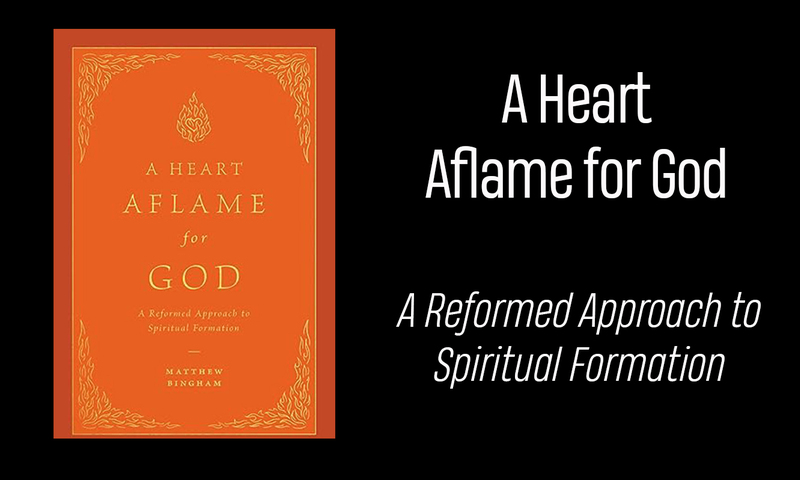I recently read a deep and thoughtful book on Christian living entitled . I reached out to the author, Matthew Bingham, to see if he would be willing to do an interview about his book. IÔÇÖm delighted that he agreed!
Ken Berding (KB): First, can you tell us a little about yourself?
Matthew Bingham (MB): Thank you for the opportunity to share with you and your readers. I am originally from Southern California, and I currently serve as Vice President of Academic Affairs and Associate Professor of Church History at Phoenix Seminary in Scottsdale, Arizona. Before coming to Phoenix, my family and I lived in the United Kingdom for 10 years. Most of that time I was teaching at Oak Hill College in London, and prior to that I served as a pastor in Northern Ireland and the southeastern United States. I am very happily married to Shelley and we have four children ranging in age from 15 to 4.
KB: What prompted you to write this book?
MB: A Heart Aflame for God grew most directly out of my teaching at Oak Hill College, where I was asked to teach an elective on spiritual formation. I thought this was a wonderful idea, as many of our students had expressed both interest in the subject and some confusion as to where to begin. So I came into it with great enthusiasm, but my enthusiasm waned somewhat as I looked for appropriate books to assign. My academic work has involved a great deal of research into early modern England and the religious culture of English and North American Puritanism, and I have long been impressed by the warm devotional work that these men and women produced, especially during the seventeenth century. As a result, I was somewhat puzzled to find that much of the spiritual formation literature seemed to curiously ignore or at least downplay a body of literature that I had assumed would be of first importance for evangelical Protestants. This led me to dispense with the idea of using a pre-existing book for the class, and instead I turned to effectively writing my own, a process which eventually led to A Heart Aflame for God.
KB: What makes this book different from other books on spiritual formation?
MB: Well, in some ways, this book has much in common with other books on spiritual formation: it explores what we mean by the term and covers both its theological underpinnings and its practical application. But where this book differs from much of whatÔÇÖs already on offer is in its distinctively and, I hope, consistently Reformed approach to the subject. Many works on spiritual formation draw on a wide range of sources, all drawing upon very different theological perspectives. This isnÔÇÖt necessarily a bad thing, but it can become confusing for readers when theologians holding distinct and sometimes incompatible theological paradigms are blended and bundled together as though they all are basically pointing in the same direction. I believe that our approach to spiritual formation should be downstream from and consistent with our theological convictions. So, in writing A Heart Aflame for God, I wanted to provide a resource and guide to spiritual formation that was firmly rooted within and consistent with the Reformed tradition. To that end, the book draws heavily on Reformed theologians and pastors with particular attention paid to the English Puritans. In that sense, the book is something of a cross between J.I. PackerÔÇÖs A Quest for Godliness (1990) and Donald WhitneyÔÇÖs Spiritual Disciplines for the Christian Life (1991).
KB: Who would you say is your target audience with this book and what do you hope they will get out of it?
MB: I would say that the book is written for all Christians looking to understand and explore more deeply the inner logic, theological rationale, and historical underpinnings of a distinctively evangelical Protestant approach to Christian piety. The target audience of A Heart Aflame for God includes pastors and theological students, alongside any thoughtful Christian looking for a more extended treatment of these themes. I think the book occupies an intermediate space in terms of where itÔÇÖs pitched, balancing accessibility with an awareness of wider scholarly conversations.
In terms of what I hope readers will take away from the book, I would say there are two overriding aims. My primary aim is that readers will be encouraged in their walk with God. I long to see Christians excited by the possibility of growing ÔÇ£in the grace and knowledge of our Lord and Savior Jesus ChristÔÇØ (2 Pet. 3:18) and I want them to come away with a clear, biblical vision of what that looks like and how to get there.
My secondary aim is to address those within evangelical circles who are feeling the allure of non-evangelical traditions. Disillusioned and frustrated by a religious culture that, at its worst, can seem superficial and shallow, increasing numbers of Christians reared in evangelical churches are seeking a deeper, more serious Christian expression. In response to this, some recent books on spiritual formation aimed toward evangelicals have, in my opinion, strayed into methods, approaches, and influences which are out of step with the Reformation tradition they purport to represent. If someone wants to carefully and prayerfully leave the Protestant tradition, then, while I wish they wouldnÔÇÖt, that is, of course, their decision to make. But what I find discouraging is when we encounter evangelicals who abandon their heritage without first taking the time to really understand what their heritage is actually all about. IÔÇÖm convinced that the depth and seriousness that disaffected evangelicals rightly long for can be had without having to look to Rome or Constantinople.
KB: You obviously spent a lot of time reading authors in the Reformed stream, especially from the early-modern period. What are some of the most important takeaways from the things you read?
MB: There were many things that I found stimulating and enriching while researching this book. For example, I was fascinated to learn about the extent to which Reformed authors looked to the natural world as a rich stimulus for devotional reflection, an aspect of the Christian life that I fear we sometimes lose touch with today.
But the most significant takeaway from the Reformed authors I read was their strong and unwavering commitment to the proposition that spiritual formation is based upon three core disciplines: Bible intake, meditation and prayer. In the book, I describe these three as ÔÇ£the Reformation Triangle,ÔÇØ a term used to highlight the triangulated relationship between these disciplines that lies at the heart of historic Protestant spiritual formation. Taken together, these three can be conceived as a conversation between the believer and God: we hear from God through his word; we reflect upon what weÔÇÖve heard in meditation; and we then respond to God in prayer. As the book demonstrates, among early modern Reformed and Puritan authors, these three activities were so closely conjoined that they would often be used interchangeably as though they were all actually components of one basic activity. They flow into one another and are sometimes, in practice, scarcely distinguishable, together constituting real communion with Triune God.
This and other resources are available at .
ÔÇöÔÂ─öÔÂ─ö
To learn more about spiritual formation in conversation with the writings of the heirs of the Reformation, pick up a copy of Matthew BinghamÔÇÖs book: , , or .
 Biola University
Biola University




